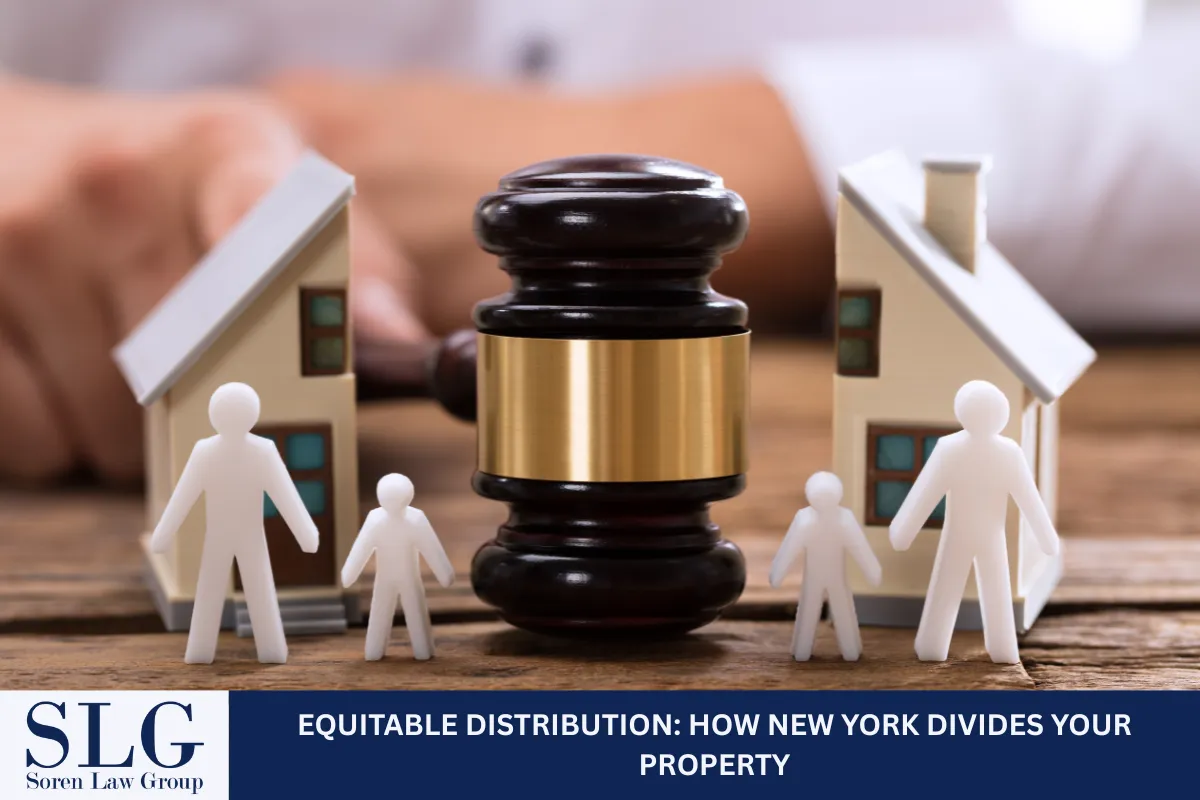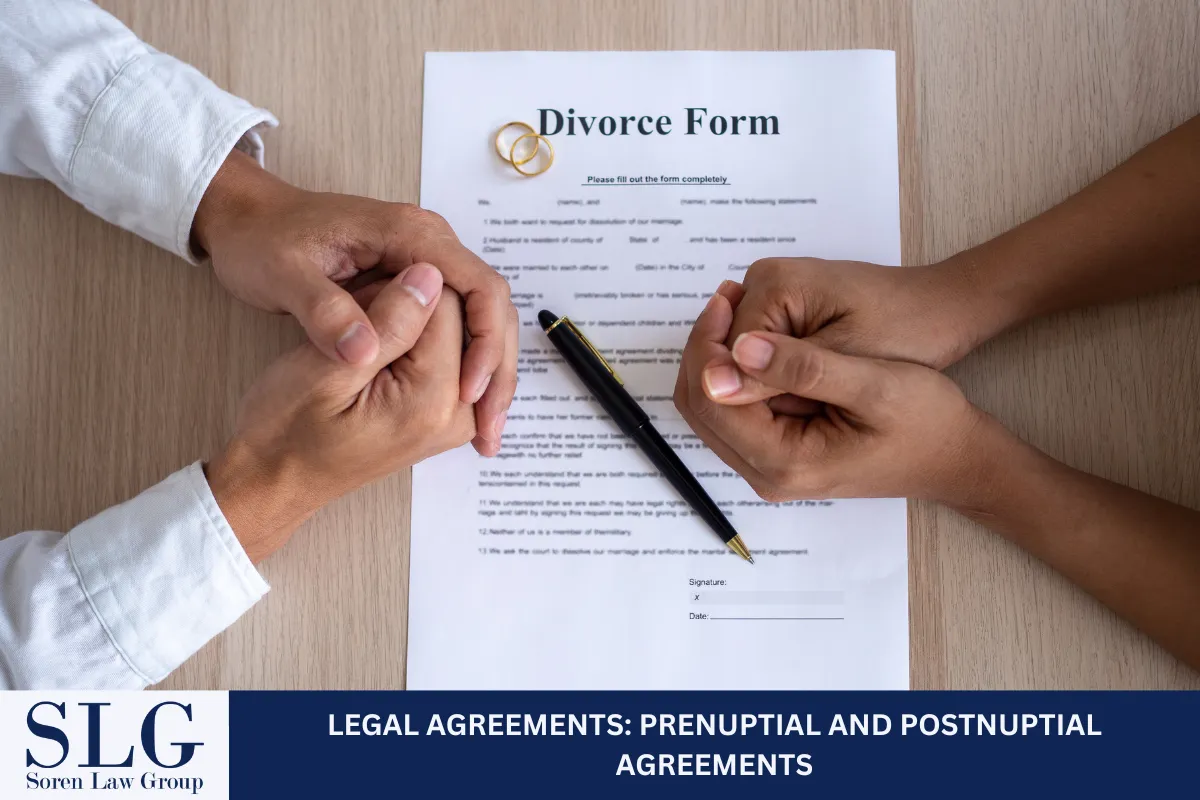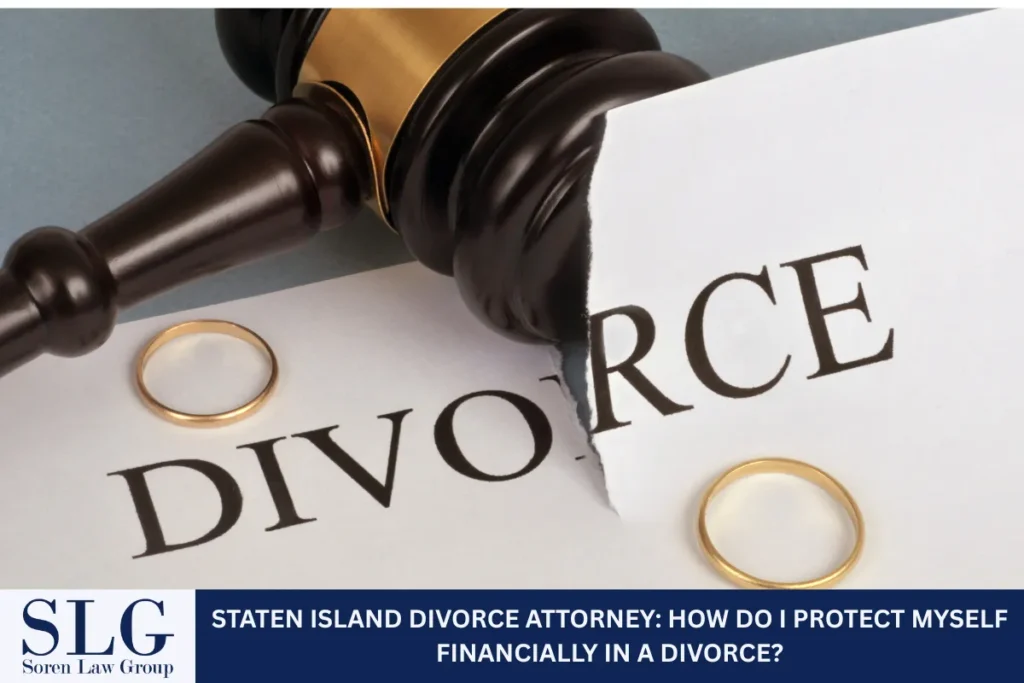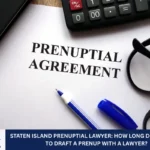If you’re searching for a divorce attorney, you’re likely facing the stress and uncertainty of ending a marriage—and you might be especially worried about your financial future. Here’s the problem: Divorce isn’t just about signing papers, splitting up, and moving on. It’s also about dividing money, property, debts, and sometimes even businesses and retirement accounts. The complex laws in New York can make this process even more overwhelming, and a single financial misstep could harm your future security. But don’t worry—there are concrete steps you can take to protect what you’ve built. This article is your step-by-step guide, with all the details a Staten Island divorce attorney would want you to know, from preparation to post-divorce peace of mind.
Your Financial Life and Divorce

Before we dive into strategy, let’s talk language. In New York and Staten Island, terms like “marital property,” “separate property,” and “equitable distribution” are commonly used. Here’s what they mean:
- Marital Assets/Property: Everything you or your spouse acquired during marriage—think paychecks, cars bought together, and even that new coffee maker.
- Separate Property: What one spouse owned before the marriage, along with certain gifts and inheritances.
- Equitable Distribution: Instead of a simple 50-50 split, New York law aims for a “fair” division that considers many factors.
Understanding these foundations is the first step in protecting your finances during the divorce process.
Inventory and Documentation: Your First Line of Defense
One of the best actions you can take is to get organized. You need a complete picture of your financial partnership as part of your legal representation. Here is a checklist to get you started:
- Inventory All Assets: List everything—bank accounts, retirement accounts, investment accounts, real estate holdings, vehicles, valuable items, and family-owned businesses.
- Assess Debts: Include mortgages, HELOCs, credit cards, personal loans, and other obligations.
- Gather Supporting Documentation: Collect bank statements, pension statements, credit reports, tax returns (last 3–5 years), business valuation documents, savings plans, and any relevant marital history items.
- Secure Documentation: Store copies in a safe, private location, such as a secure digital folder or a trusted friend’s house.
- Monitor Your Credit Report: Keep an eye out for new debts or suspicious activity; consider placing a fraud alert if needed.
This asset inventory arms your legal team with what they need for the Dissolution of Marriage and subsequent property division negotiations.
Equitable Distribution: How New York Divides Your Property

New York courts use “equitable distribution” to divide marital assets—but “equitable” doesn’t always mean “equal.” Instead, a judge (or you and your lawyers in a Settlement Agreement) considers:
- Length of the marriage
- Income and future earning ability
- Contributions as a homemaker
- Wasteful dissipation of assets (spending money on non-marital things)
- Health and age of both parties
- Direct contributions to property or business growth
Marital property usually means everything acquired during marriage, while separate property is what you brought into the relationship, gifts, or inheritances (if kept separate). If separate property is “commingled” (for example, inheritance money used to renovate the marital house), it might become marital property unless you can trace its source.
Protecting Separate Property: Avoiding Commingling
To safeguard your separate assets:
- Keep Records: Always document what was separate and how it was used.
- Avoid Mixing Funds: Don’t deposit inheritance or pre-marriage money into joint accounts.
- Trace Sources: If you did combine funds, work with a divorce lawyer and possibly a forensic accountant to trace funds back to their origins.
Careful documentation is your ally in protecting non-marital property.
Freezing and Separating Finances
Once divorce seems likely, take practical steps:
- Freeze/Close Joint Accounts: Prevent new debts or unauthorized withdrawals.
- Open New Accounts: Start individual checking, savings, and credit accounts.
- Change Passwords and Address: Secure your online accounts and ensure financial mail is sent to you, not a shared address.
- Comply with Automatic Orders: New York issues automatic orders that prohibit either spouse from hiding or moving assets; always follow them.
These steps help preserve your financial stability and prevent surprises.
Business Owners and High-Net-Worth Divorces

If you own a business or have a high net worth, achieving fair asset valuation gets complex. A business’s value is often a marital asset, even if only one spouse runs it. Protecting your interests involves:
- Business Valuation Experts: Experienced professionals calculate a business’s value for property division.
- Separate vs. Marital Value: Only growth during marriage is generally “marital property.”
- Asset Protection Strategies: Consider buy-sell agreements, trusts, or clear documentation of ownership.
- Tax Implications: Understand how business division affects taxes; consult an accountant or tax attorney.
Experienced legal representation is vital for complex divorce needs and safeguarding your business.
Retirement Accounts and Investment Assets
Retirement assets—401(k) s, IRAs, pensions, and defined benefit or contribution plans—must be divided carefully. A court can issue a QDRO (Qualified Domestic Relations Order) or a DRO (Domestic Relations Order) for public pensions, allowing tax-advantaged splits.
Other points to consider:
- Valuation Date: Market fluctuation impacts value; know the crucial date.
- Division Rules: Each type of retirement account has specific rules.
- Investment Accounts and Crypto: Stocks, RSUs, ESPPs, and cryptocurrencies get appraised at marital value.
Dividing these assets without triggering tax penalties or losing significant value requires careful, informed planning.
Child Support, Spousal Support, and Maintenance
New York calculates child support using the Child Support Standards Act (CSSA), which bases payments on a percentage of parental income and the number of children. Spousal support (alimony/spousal maintenance) may be required between spouses, especially after a long marriage or if there’s a large income difference.
- Temporary Support (“Pendente Lite”): The court may award temporary maintenance pending the divorce.
- Enforcement and Modification: Orders for support can be adjusted if circumstances change later.
- Custody Battle Impact: Child custody arrangements may affect the amount or duration of child support and spousal support payments.
Understanding these payments—and planning for them—is crucial in financial adjustments post-divorce.
Support for Gray Divorce and Retirement Planning
“Gray divorce”—divorce over age 50—adds special financial considerations:
- Social Security: Know if you’re entitled to spousal benefits based on your ex’s record.
- Retirement Schedules: Splitting retirement assets late in life can affect your planned lifestyle.
- Health Insurance & COBRA: Consider insurance continuity after divorce, especially if you relied on your spouse’s plan.
Make sure health and life insurance, estate planning documents, and beneficiary designations are reviewed and updated after divorce.
Legal Agreements: Prenuptial and Postnuptial Agreements

If you already have a prenuptial agreement or postnuptial agreement, this can be your best financial safety net. These contracts can:
- Define what property stays separate.
- Determine spousal support terms.
- Resolve business division or valuation before conflict starts.
Enforceability in New York depends on full financial disclosure and no coercion during signing. Consult a matrimonial law expert to review or negotiate these documents.
Discovery Process: Ensuring Financial Transparency
The New York divorce process requires full financial disclosure. Both spouses must complete a Statement of Net Worth, listing income, expenses, assets, and debts. Through discovery, your divorce lawyer can:
- Use subpoenas, interrogatories, and depositions to force disclosure.
- Hire forensic accountants to hunt for hidden assets, asset concealment, or wasteful dissipation.
- Request appraisals for hard-to-value items such as art, antiques, or businesses.
Never hide assets or attempt secret transfers; courts frown on this, and you risk legal consequences.
Dealing with Marital Debts and Credit Protection
Just like assets, debts are split during property division. This includes:
- Mortgages (your marital house)
- HELOCs
- Credit cards (even if only one name appears)
- Car loans and other obligations
Steps to protect your credit:
- Freeze joint cards if possible.
- Monitor your credit report for unauthorized credit lines or loans.
- Alert creditors to your pending divorce, especially for family-owned businesses.
- Establish a budget and emergency fund; future support is uncertain at first.
Taking these steps shields your financial reputation during a contested divorce.
Divorce Options: Mediation, Litigation, or Collaborative Law
There are different ways to resolve a divorce:
- Uncontested Divorce: You and your spouse agree on everything; the fastest and least expensive option.
- Contested Divorce: You disagree on key issues like asset division, custody, or support; needs court intervention or trials.
- Mediation: A neutral party helps reach an agreement more quickly and cost-effectively.
- Collaborative Divorce: Both sides and their attorneys commit to negotiating rather than fighting in court.
Choose the approach that matches your circumstances and financial complexity.
The Role of Experts in Divorce

A complex divorce often calls for more than just a divorce attorney or family law legal team. You may need:
- Forensic accountant / CPA
- Business valuation expert
- Real estate appraiser
- Financial planner / CFP
- Vocational expert (to assess earning potential)
- Guardian ad litem (child-related, if needed)
Their help ensures accurate asset valuation, fair support calculations, and lasting financial security.
The Financial To-Do List: Step-by-Step Protection
Before Filing for Divorce
- Create your asset and debt inventory
- Gather financial records (tax returns, bank statements)
- Consult a divorce attorney or divorce lawyer about strategy
- Open individual bank/credit accounts
- Secure personal digital files, passwords, and financial mail
- Set up an emergency fund or budget
During the Divorce Process
- Complete and file financial disclosure (Statement of Net Worth)
- Respond promptly to discovery
- Work with professionals for valuations
- Follow all court orders and automatic orders
- Avoid hiding or dissipating assets
- Consider mediation or settlements when possible
After Divorce
- Update beneficiaries on retirement/insurance accounts
- Review and redraw your estate plan/will
- Confirm all joint accounts are closed or transferred
- Monitor your credit report for issues
- Adjust your budget to the new support or payment schedules
Common Mistakes to Avoid
- Failing to collect financial records early
- Relying on verbal agreements—always get a Court Order or written Settlement Agreement
- Not separating joint accounts soon enough
- Forgetting to account for the tax consequences of property division
- Ignoring the impact of spousal or child support on your budget
Staten Island Divorce Attorney – Soren Law Group

Going through a divorce in Staten Island? Soren Law Group is your trusted partner for protecting your financial future during this challenging time. Our experienced divorce attorneys understand New York’s complex laws on property division, marital versus separate assets, and support. We offer personalized strategies to safeguard your assets, retirement accounts, and business interests—ensuring you don’t make costly mistakes. From initial documentation through negotiation and settlement, our team stands by your side, advocating for your financial security every step of the way. Don’t leave your future to chance. Call us today at (718) 815-4500 to schedule a confidential consultation and protect what you’ve worked so hard for!
Five Essential Questions on Protecting Finances in a Staten Island Divorce
1. What happens if my spouse tries to hide assets during divorce proceedings?
If you suspect your spouse is concealing assets, your divorce attorney can request discovery from the court. This process may include subpoenas for financial records, depositions, and even the involvement of a forensic accountant. New York’s legal process requires both parties to complete a Statement of Net Worth, listing all assets and debts. If your spouse is caught hiding assets, the consequences are severe—they could lose their share, face legal penalties, or the judge might rule against them entirely on those assets. Full transparency is essential, and courts can revisit settlements if hidden assets are discovered later.
2. Is it necessary to get a business or property professionally valued?
Absolutely. Professional valuation ensures that both spouses receive a fair share of marital property, especially when businesses or unique assets like art or collectibles are involved. Divorce lawyers often work with business valuation experts and real estate appraisers to establish accurate values. Inaccurate or unsupported values can dramatically affect your settlement and may even trigger future legal battles. Courts and mediators rely on professional valuations to guide equitable distribution, making these appraisals crucial for complex divorces.
3. How do taxes affect property division during divorce in New York?
Tax implications are woven into almost every financial aspect of divorce. If you receive or transfer property during a divorce, there may be tax consequences, like capital gains. Retirement asset splits via QDROs generally avoid early withdrawal penalties, but future withdrawals can still be taxed as income. Alimony payments may have tax implications as well, depending on when your divorce was finalized. Always consult a financial advisor or tax professional when finalizing your Settlement Agreement to avoid surprises. Proper planning ensures you don’t sacrifice your fair share to unexpected tax bills.
4. Do I need a prenuptial or postnuptial agreement to protect my assets?
While you don’t have to have one, prenuptial and postnuptial agreements are among the best tools for asset protection in divorce. These agreements specify in advance how property and support are handled if the marriage ends. In New York, such documents are enforceable if both parties fully disclose their finances and sign voluntarily. Even if you don’t have one, work with your divorce lawyer to document separate property and avoid commingling to protect your interests as much as possible.
5. What if I need financial help during the divorce process?
You can request temporary financial support, known as “pendente lite” maintenance, from the court while your divorce is ongoing. This may cover living expenses, attorney’s fees, and even child support payments. Your attorney will file a motion, and the judge will make a temporary Court Order requiring your spouse to help until the divorce is done. This provision is especially important if you don’t have access to all marital assets or income during the proceedings.
Read more: When Should You Choose Annulment Over Divorce? Divorce Attorney Explains in Staten Island, NY











